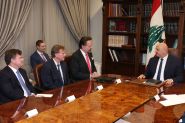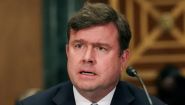
In an interview with Al Arabiya News anchor Hadley Gamble, US Deputy Special Envoy for the Middle East Morgan Ortagus urged for the complete disarmament of Hezbollah. She compared the Iran-backed group to a “cancer” that Lebanon must excise if it hopes to recover.
During a diplomatic visit to the United Arab Emirates, Ortagus emphasized that Hezbollah’s presence in Lebanon was a significant obstacle to the country's recovery, stating in the interview, “When you have cancer, you don’t treat part of the cancer in your body and let the rest of it grow and fester, you cut the cancer out.”
Ortagus firmly rejected the long-held concern that disarming Hezbollah could lead to civil war, dismissing these fears as unsubstantiated. “We’ve been hearing that for 20 years,” she said, adding that the situation could no longer be ignored.
The US envoy also accused Hezbollah and Iran of dragging Lebanon into the conflict with Israel. “The government of Lebanon didn’t want to go to war with Israel,” she explained. “It was on October 8, 2023, that Hezbollah and Iran decided to get into the war… people were forced into a war that nobody wanted to be in.”
Ortagus voiced strong support for Lebanese President Joseph Aoun and Prime Minister Nawaf Salam, calling Lebanon's current situation “worse than Greece during the financial crisis.” She pointed out that Lebanon’s financial crisis has reached an unprecedented level and stressed that this moment represented a “once-in-a-generation” opportunity for reform.
She also praised the creation of a new technocratic Cabinet “made up of Lebanese professionals from the diaspora, including experts from major international firms such as HSBC, JP Morgan and Blackstone.” These figures, according to Ortagus, “returned to Lebanon to help rebuild the country, vowing to avoid party affiliations and not run in upcoming parliamentary elections.”
On the topic of national security, Ortagus defended the Lebanese Armed Forces (LAF), stating that they were fully capable of assuming security duties from Hezbollah, provided there is political will. “If we’ve been providing assistance for several decades and they couldn’t do it, then there’s a problem with their US assistance,” she told Al Arabiya News.
Ortagus stressed the urgency of passing stalled financial sector reforms, particularly concerning Lebanon’s bank secrecy laws and a bank reorganization. She warned that without passing these reforms, Lebanon would struggle to secure support from the IMF and the World Bank. “You can’t make the case [for support] if you haven’t passed the legislation in Parliament to show that you’re serious about these reforms,” she said.
In discussing broader regional tensions, Ortagus criticized Iran for its ongoing defiance of the Joint Comprehensive Plan of Action (JCPOA), stating that Tehran had been “in defiance of the JCPOA for years.” She also pointed out that Iran has been enriching uranium to levels of at least 60% since April 2021, describing the situation as “incredibly dangerous” and emphasizing the increasing risks posed by Iran’s nuclear ambitions.
As tensions continue to rise in the region, Ortagus emphasized that the US would not return to “indirect talks that string us along.” She insisted that any future negotiations with Iran would need to be “quick” and “serious about dismantling their nuclear weapons program.”



Comments